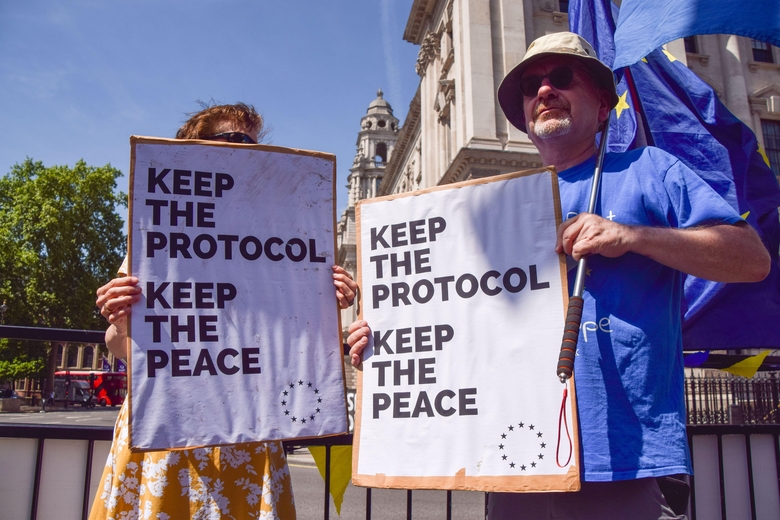The Protocol’s critics hate it for its success, not its failure. And they’re prepared to eviscerate the Good Friday Agreement to protect their political projects.
The government’s “Northern Ireland Protocol Bill” confirmed the worst fears of many. It violates international law, thus stymieing negotiations on trade agreements, emboldening autocrats in China and Russia, and (potentially) permanently damaging the UK’s global standing. Domestically, it gives the government the power to rule without parliament in respect of Northern Ireland. Moreover, it is based on a lie: that the Protocol is bad for Northern Ireland and endangersthe Good Friday Agreement. Incredibly, this lie has gone largely unchallenged. In fact, the Protocol is both good for, and popular in, Northern Ireland.
Understanding the Protocol requires understanding the Good Friday Agreement. The agreement ended a conflict which was about identity as much a politics. The Good Friday Agreement seeks to both ease political tensions and reconcile competing identities. It recognises that citizens of Northern Ireland can consider themselves British, Irish, or both. This was given practical effect through the free-movement rights guaranteed by the UK and Ireland’s EU membership. The Good Friday Agreement also enshrines Northern Ireland’s right to self-determination, requiring the UK government to hold a referendum there appears to be popular support for re-unification with the Republic. The agreement thus places questions of bothpersonal and national identity in the hands of the Northern Irish people.
Brexit presented an existential challenge to the Good Friday Agreement, removing the free movement rights on which the agreement is based. The Protocol seeks to mitigate this by (in effect) allowing Northern Ireland to remain in the single market. The trade-off is that goods and services entering from non- EU states (including the mainland UK) must undergo customs checks. The Protocol maintains the Good Friday Agreement’s respect for Northern Irish self-determination, providing for the elected members of the Northern Ireland Assembly to vote on whether it should remain in place after 2024. The Protocol is far from an ideal solution, but it ameliorates some of the most serious problems caused by Brexit and, crucially, preserves the spirit as well as the letter of the Good Friday Agreement.


The Protocol has been remarkably successful. Northern Irish citizenscontinue to enjoy many of the benefits of EU citizenship while still remaining in the UK. Consequently, Northern Ireland’s economy hit a 13-year peak in 2021. It continues to grow while the rest of the UK tips towards recession. Manufacturing jobs are growing four times faster than the UK average. The Protocol has facilitated an additional £1bn of trade with the Republic alone (while costing just £200m in total). Ironically most businesses report that the real economic danger comes from the uncertainty generated byWestminster and DUP politicians’grandstanding on the Protocol.
Perhaps unsurprisingly, the Protocol is broadly popular with the Northern Irish people. Most want it to continue after 2024. In the May elections, parties supporting the Protocol won the majority of seats.The DUP (which made opposition to the Protocol the central plank of its campaign) crashed to its worst result since 1998.
Why, then, is the UK government gambling the UK’s international reputation (and the DUP gambling its political future) to overturn something that works?
For both, the Protocol’s successthreatens their political projects. Brexit is the government’s signature political achievement. It has spent much of the time since pretending that it’s inevitable consequences (lorry queues across Kent, chaos at airports, and the worst economic performance in the G20 except for Russia) are not happening. Northern Ireland exposes this lie, providing a constant reminder of what things might be like if the UK had not left the EU.
The DUP’s raison d’etre is keeping Northern Ireland as close to the UK as possible. Brexit (which the DUP supported) presented the prospect of severing connections between the North and the Republic. Instead, the Protocol maintains (and arguably enhances) those connections. The more the Northern Irish people benefit from their relationship with the Republic, the greater the danger for the DUP. After just two years of Brexit, polls on both sides of the borderfuelled speculation about a re-unification referendum in the next decade – the ultimate failure of the DUP’s project.
Eliminating the Protocol is thus a political imperative for both the UK government and the DUP. Contrary to their protestations, they’re sacrificing the Good Friday Agreement to do it. The Protocol Bill drives a coach and horses through the essence of the Good Friday Agreement. It strips away the principle of self-determination: imposing the will of Westminster (regardless of the wishes of the Northern Irish people) rather than allowing Stormont to decide for itself. It makes the right of Northern Irish citizens to choose their own identity meaningless, by closing the North/South border. It mocks power-sharing democracy by enforcing the demands of the DUP against the wishes of the majority of voters.
In an age dominated by misinformation, the government’s big lie about the Protocol could be the most catastrophic yet. To protect their own political interests, the government and DUP will enforce a (likely) recession on the Northern Irish people and eviscerate the agreement that has guaranteed peace for the last twenty years. The price will be paid by the Northern Irish people, not the Protocol’s critics. It may be a return to the Troubles.
Sam Fowles is a barrister and lecturer in law at St Edmund Hall, University of Oxford. His book, Overruled: Confronting our Vanishing Democracy in 8 Cases is out on 23 June and available to pre-order. He tweets @SamFowles.

